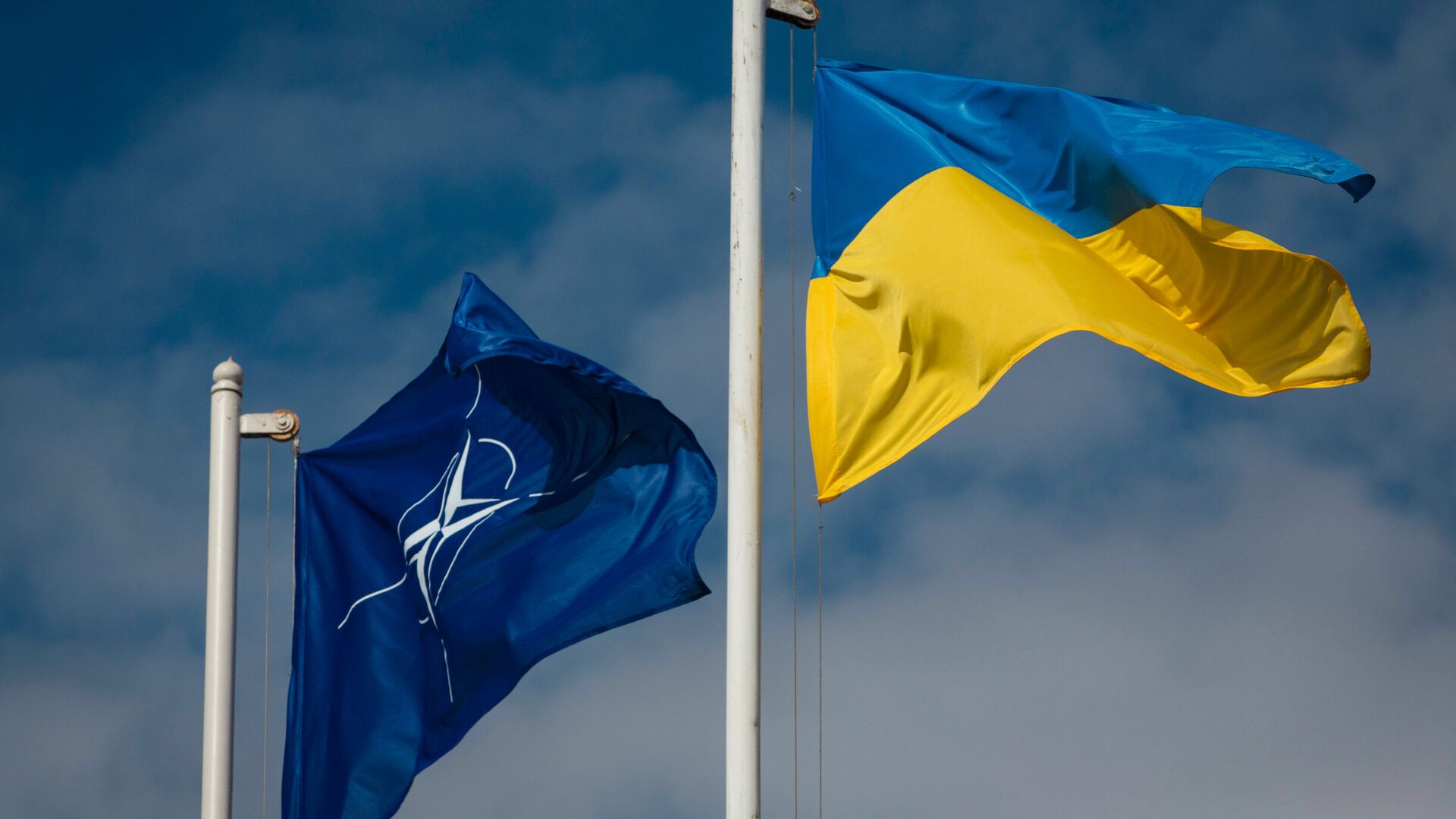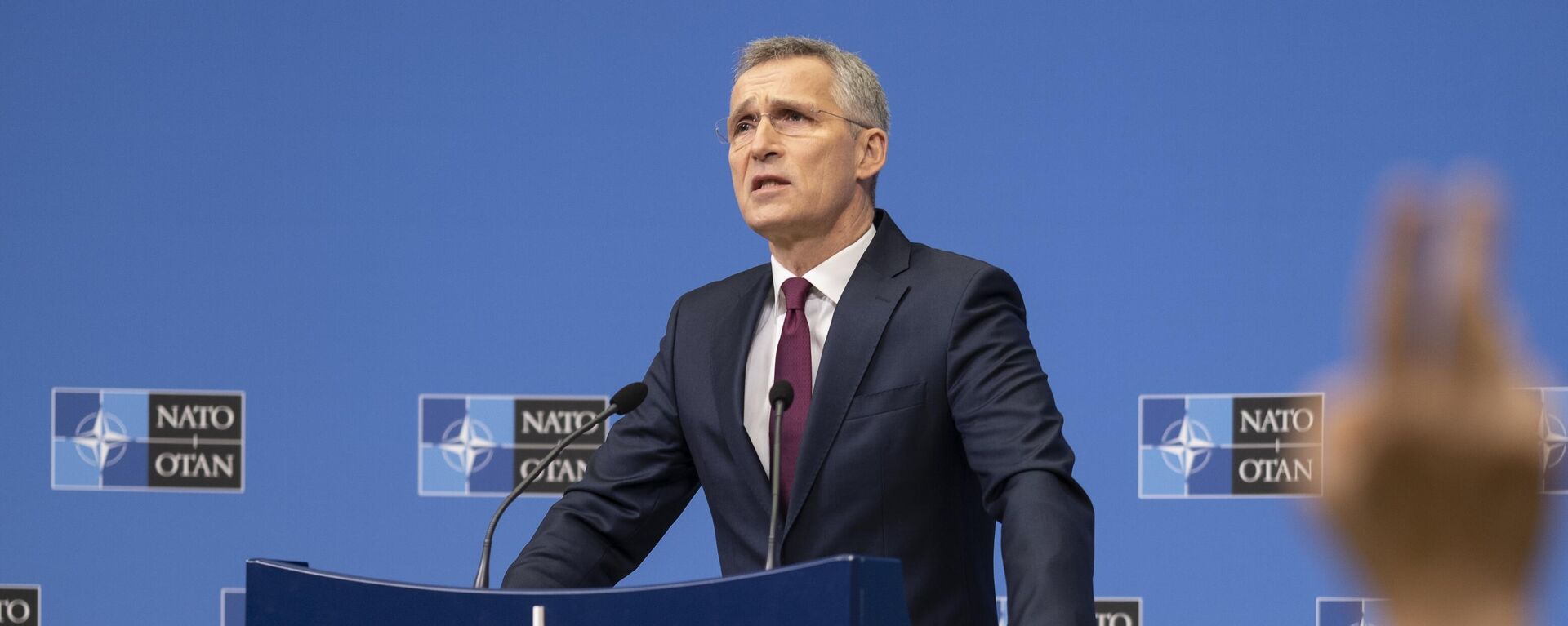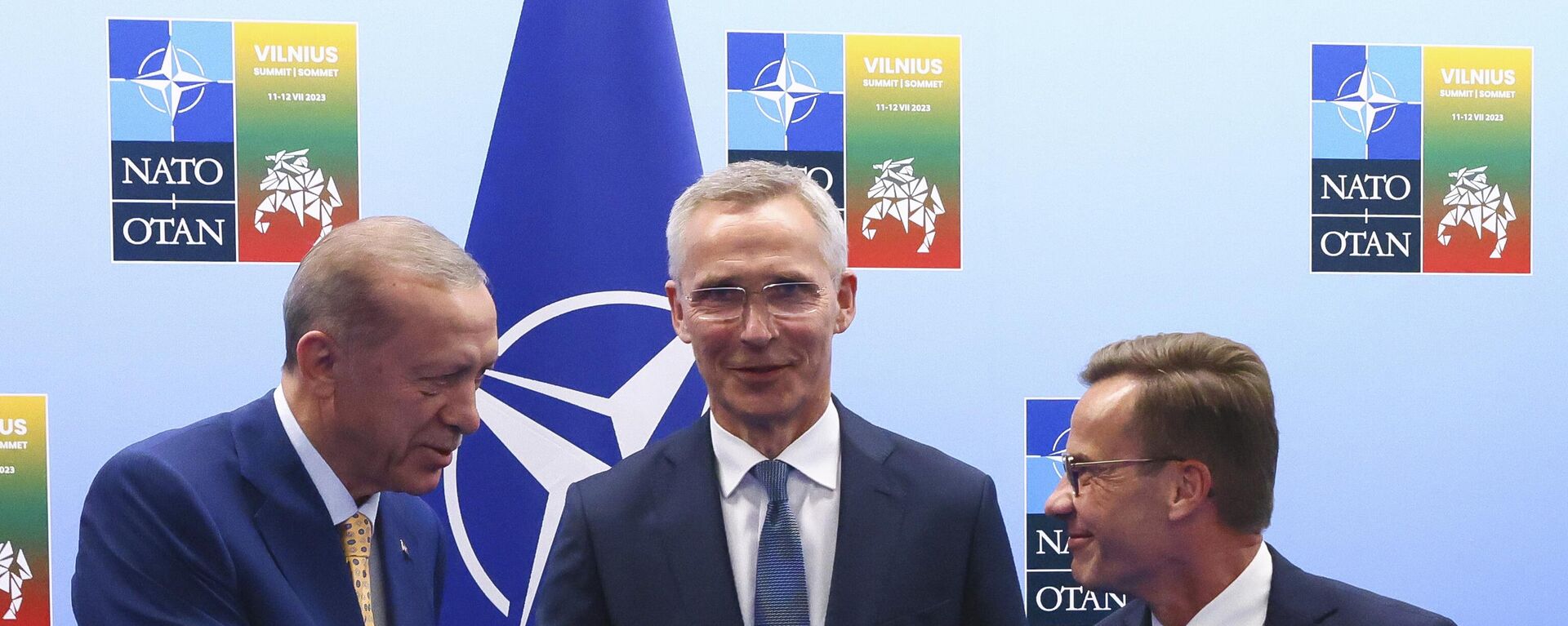https://sputnikglobe.com/20230711/kiev-will-come-up-short-in-natos-membership-metrics-even-after-bloc-scraps-action-plan-1111820270.html
Kiev ‘Will Come Up Short’ in NATO’s Membership Metrics Even After Bloc Scraps Action Plan
Kiev ‘Will Come Up Short’ in NATO’s Membership Metrics Even After Bloc Scraps Action Plan
Sputnik International
Two former Pentagon officials told Sputnik that despite Kiev’s constant pleadings, the NATO powers are less likely to support Ukraine’s admission into the alliance than ever before.
2023-07-11T20:49+0000
2023-07-11T20:49+0000
2023-07-11T20:47+0000
analysis
michael maloof
european union (eu)
membership action plan
ukraine
nato
https://cdn1.img.sputnikglobe.com/img/103807/10/1038071068_0:160:3073:1888_1920x0_80_0_0_178af697b66e6dc29a91fc1f29bfde73.jpg
At the NATO summit in Vilnius, Lithuania, on Tuesday, the alliance decided to drop the Membership Action Plan (MPA) procedure for Ukraine, which laid out a customized list of reforms and guidelines by which the country’s application for membership might be considered. While doing so could make it easier for Kiev to join the alliance, the NATO powers have rejected the possibility that Ukraine would be invited to join before the conflict with Russia is over.NATO has spoken of Ukraine as a potential future member since 2008, although it has never provided a timeframe for its admission.Michael Maloof, a former senior security policy analyst in the US Office of the Secretary of Defense, told Sputnik on Tuesday that NATO is extremely wary of being drawn into a direct conflict with Russia, and so has given little in the way of concrete statements regarding its relationship with Ukraine.“So I think it's clear, particularly as [US] President [Joe] Biden himself has announced, that as long as Ukraine is in a state of war, there will be no membership. And if there was an attempt to do that while there's still conflict, and if Ukraine, hypothetically, was a member of NATO, that would automatically invoke Article Five. And Article Five under NATO's alliance is ‘an attack on one is an attack on all.’ So NATO's trying to avoid that at all costs.”David T. Pyne, an EMP Task Force scholar and former US Department of Defense officer, said it was “a symbolic move only.”“NATO leaders understand that there is no path for Ukraine to join NATO because Ukraine does not meet many of the requirements, such as having democratic institutions, not having any foreign troops on its territory, not having any of its territory in dispute and not being at war with another country among others,” Pyne explained.However, German Chancellor Olaf Scholz recently pledged that Kiev would receive “security assurances” after the conflict is over, which one German think tank said would include a "pact for security, reconstruction and peace." Maloof said Berlin was in a poor position to be investing in rebuilding Ukraine, but would likely focus on ensuring the Ukrainian military’s systems are more compatible with NATO systems - a challenge in the present conflict.Pyne noted that Kiev had been requesting such assurances since March 2022, shortly after the conflict began, and that Russia had agreed Ukraine’s neutrality should be guaranteed by the United Nations Security Council, which includes NATO allies US, UK and France.“However, Biden refused to provide Ukraine with any security guarantees at that time, fearing it would provoke an escalation of the conflict with Russia. The key Russian demand has been that any security assurances must be outside of NATO. I think that is exactly what NATO is considering, but they are only considering security guarantees after Ukraine has agreed to negotiate an end,” he said, noting it was more likely after the Ukrainian counteroffensive “peters out.”Giving firm shape to any prospective NATO guarantees is further complicated by the fact that NATO member states have different goals in Ukraine.“It's just not going to happen, because the United States and the other Western countries already are complaining about shortages in their own logistical supplies. Unless and until these countries decide to go on an active war footing - which they do not want to do, that would send some very serious signals to Russia - the push is going to try to be in time to get Ukraine to come to a settlement of some kind. That's ultimately what probably will be the outcome.”“What's clear is just how unclear the terms will be among the NATO countries and what are the assurances that they will be giving to Ukraine in the years to come. And given their own economic posture and the politics that are going on, you're not going to know anything for quite some time to come,” he said.Pyne explained “there is a division between the original NATO member states and the new NATO members which joined following the collapse of the Soviet Union. Nine NATO member states are on record supporting Ukraine’s immediate admission into NATO; the other 22 are not, as they are understandably concerned that doing so would greatly escalate the conflict and perhaps even embroil NATO in a direct war with Russia it does not want. Germany, Hungary and Turkiye would never support Ukraine joining NATO, and given that the vote to add new member states must be unanimous among the 31 member states that likely means Ukraine will never be admitted to NATO.”Pyne further noted Washington had proposed an Israel-like security assurance for Ukraine, which would allow it to continue selling them advanced weapons but not compel the US to go to war in Ukraine’s defense.Returning to the NATO summit, Maloof noted Turkiye had given its approval to Sweden’s admission to the alliance on Monday, which the expert characterized as an attempt to gain “leverage” for Ankara’s European Union bid.Pyne added that Erdogan “is likely to hold fast to his position that the Turkish parliament will only vote on Sweden’s membership bid to join NATO if Turkiye is first admitted into the EU.”
https://sputnikglobe.com/20230711/stoltenberg-all-nato-members-agree-ukraine-cant-join-alliance-until-end-of-hostilities-1111815094.html
https://sputnikglobe.com/20230710/stoltenberg-erdogan-has-agreed-to-forward-swedens-nato-bid-to-parliament-1111798921.html
ukraine
Sputnik International
feedback@sputniknews.com
+74956456601
MIA „Rossiya Segodnya“
2023
News
en_EN
Sputnik International
feedback@sputniknews.com
+74956456601
MIA „Rossiya Segodnya“
Sputnik International
feedback@sputniknews.com
+74956456601
MIA „Rossiya Segodnya“
ukraine; nato; membership action plan
ukraine; nato; membership action plan
Kiev ‘Will Come Up Short’ in NATO’s Membership Metrics Even After Bloc Scraps Action Plan
Two former Pentagon officials told Sputnik that despite Kiev’s constant pleadings, the NATO powers are less likely to support Ukraine’s admission into the alliance than ever before, and are positioning themselves to only give Kiev certain benefits if it prevails in its conflict with Moscow.
At the NATO summit in Vilnius, Lithuania, on Tuesday, the alliance decided to drop the Membership Action Plan (MPA) procedure for Ukraine, which laid out a customized list of reforms and guidelines by which the country’s application for membership might be considered. While doing so could make it easier for Kiev to join the alliance, the NATO powers have rejected the possibility that Ukraine would be invited to join before the
conflict with Russia is over.
NATO has spoken of Ukraine as a potential future member since 2008, although it has never provided a timeframe for its admission.
Michael Maloof, a former senior security policy analyst in the US Office of the Secretary of Defense, told Sputnik on Tuesday that NATO is extremely wary of being drawn into a direct conflict with Russia, and so has given little in the way of concrete statements regarding its relationship with Ukraine.
“It's reminiscent of what happened to Georgia back in 2008: it's a territory and state in conflict,” he said. “Ukraine is a state in conflict right now, and that's against all NATO rules. And of course, Georgia never was admitted into NATO. And I would suspect that inevitably Ukraine will have the same outcome, because there does not appear to be any solution to the conflict or any kind of peace arrangement whereby you have a Ukrainian state that is not engaged in conflict.”
“So I think it's clear, particularly as [US] President [Joe] Biden himself has announced, that as long as Ukraine is in a state of war, there will be no membership. And if there was an attempt to do that while there's still conflict, and if Ukraine, hypothetically, was a member of NATO, that would automatically invoke Article Five. And Article Five under NATO's alliance is ‘an attack on one is an attack on all.’ So NATO's trying to avoid that at all costs.”
David T. Pyne, an EMP Task Force scholar and former US Department of Defense officer, said it was “a symbolic move only.”
“NATO leaders understand that there is no path for Ukraine to join NATO because Ukraine does not meet many of the requirements, such as having democratic institutions, not having any foreign troops on its territory, not having any of its territory in dispute and not being at war with another country among others,” Pyne explained.
"NATO is never going to give Ukraine a timeframe for membership for this reason.”
However, German Chancellor Olaf Scholz recently pledged that Kiev would receive “security assurances” after the conflict is over, which one German think tank said would include a "pact for security, reconstruction and peace." Maloof said Berlin was in a poor position to be investing in rebuilding Ukraine, but would likely focus on ensuring the Ukrainian military’s systems are more compatible with NATO systems - a challenge in the present conflict.
“That was one of the drawbacks with Georgia: its industries could never adapt to NATO's standards, even though they tried. In fact, they didn't have much of an industrial base. I would imagine that, given the destruction of Ukraine, its industrial base is pretty well decimated and it will take years to rebuild. And reconstruction probably will be one of the provisions by Germany,” Maloof told Sputnik. “But you're not hearing any concrete offers by any of the other NATO members, even though Ukraine has taken the brunt of US and NATO policy to try and contain Russia. So in the end, I think, Ukraine will come up short.”
Pyne noted that Kiev had been requesting such assurances since March 2022, shortly after the conflict began, and that Russia had agreed Ukraine’s neutrality should be guaranteed by the United Nations Security Council, which includes NATO allies US, UK and France.
“However, Biden refused to provide Ukraine with any security guarantees at that time, fearing it would provoke an escalation of the conflict with Russia. The key Russian demand has been that any security assurances must be outside of NATO. I think that is exactly what NATO is considering, but they are only considering security guarantees after Ukraine has agreed to negotiate an end,” he said, noting it was more likely after the Ukrainian counteroffensive “peters out.”
Giving firm shape to any prospective NATO guarantees is further complicated by the fact that NATO member states have different goals in Ukraine.
“First of all, there's no end in sight to the conflict itself. Even if they were to gain a ceasefire, there's no agreement on what to agree to. Ukraine still is holding out to have all of its territory returned - and particularly the territory that Russia now occupies," Maloof said. "And a number of the NATO countries believe that Ukraine should cut its losses and go with what they've got and establish a peace settlement because they're not going to get Crimea back, they're not going to get Donbass, and there's no amount of weapons that the West can provide for Ukraine to undertake a sustained offensive to try and regain all those territories.”
“It's just not going to happen, because the United States and the other Western countries already are complaining about shortages in their own logistical supplies. Unless and until these countries decide to go on an active war footing - which they do not want to do, that would send some very serious signals to Russia - the push is going to try to be in time to get Ukraine to come to a settlement of some kind. That's ultimately what probably will be the outcome.”
“What's clear is just how unclear the terms will be among the NATO countries and what are the assurances that they will be giving to Ukraine in the years to come. And given their own economic posture and the politics that are going on, you're not going to know anything for quite some time to come,” he said.
Pyne explained “there is a division between the original NATO member states and the new NATO members which joined following the collapse of the Soviet Union. Nine NATO member states are on record supporting Ukraine’s immediate admission into NATO; the other 22 are not, as they are understandably concerned that doing so would greatly escalate the conflict and perhaps even embroil NATO in a direct war with Russia it does not want. Germany, Hungary and Turkiye would never support Ukraine joining NATO, and given that the vote to add new member states must be unanimous among the 31 member states that likely means Ukraine will never be admitted to NATO.”
Pyne further noted Washington had proposed an Israel-like security assurance for Ukraine, which would allow it to continue selling them advanced weapons but not compel the US to go to war in Ukraine’s defense.
Returning to the NATO summit, Maloof noted Turkiye had given its approval to Sweden’s admission to the alliance on Monday, which the expert characterized as an attempt to gain “leverage” for Ankara’s European Union bid.
“The whole issue had basically died. The Copenhagen Covenant basically calls for democracy and human rights and for a legal system that is fair and balanced. But the European countries believe that Turkiye is not in compliance with those provisions, even though they did allow Turkiye to accept. I personally think Turkiye it's a Muslim country now and it doesn't fulfill the definitions of what the EU countries call for in terms of democracy, but they're not so democratic themselves, when you consider how they have canceled out media coverage of a lot of things that are going on, let's say, in the Ukraine crisis, for example. And you have a very strong Brussels today that supersedes any of the member countries' laws - basically, that belong to the EU,” he said. “To hold Turkiye to a higher standard is hypocrisy.”
Pyne added that Erdogan “is likely to hold fast to his position that the Turkish parliament will only vote on Sweden’s membership bid to join NATO if Turkiye is first admitted into the EU.”




